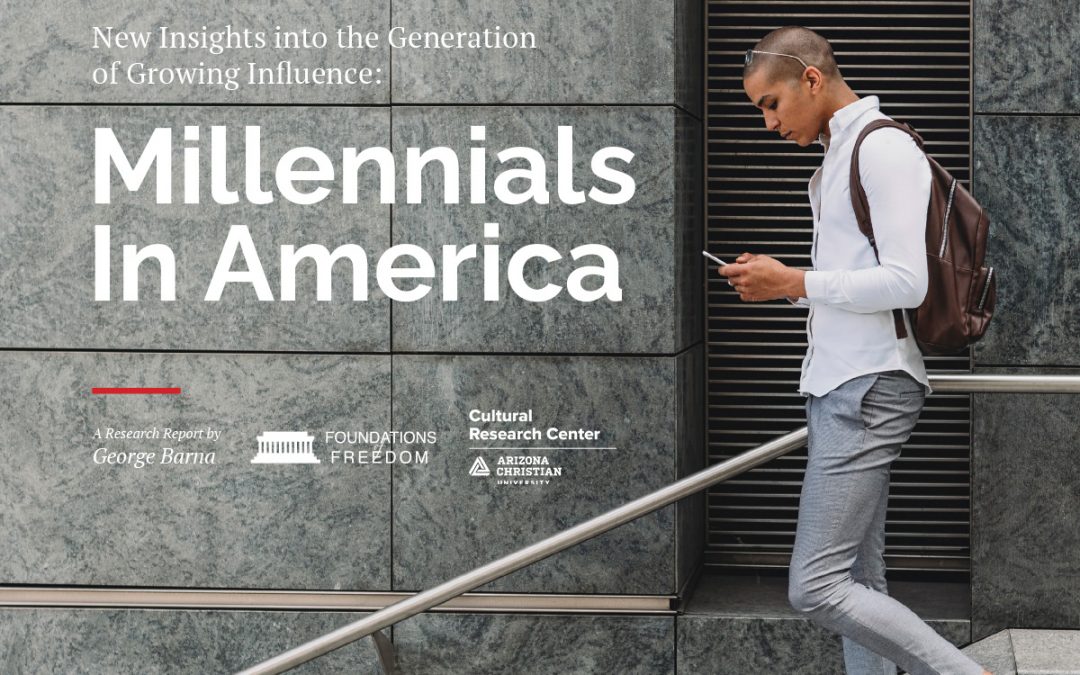BY Dr. Tracy F. Munsil, Executive Director
From the Cultural Research Center at Arizona Christian University
Three-fourths (75%) of Millennials are desperately seeking meaning and purpose in life—making them most likely among American adults to question their very reason for living.
These are some of the devastating findings from groundbreaking new Millennial research from the Cultural Research Center at Arizona Christian University and CRC Director of Research George Barna, released in Millennials in America: New Insights into the Generation of Growing Influence.
The research found that fewer than one in five Millennials (22%) contend that life is sacred, while half of the generation (50%) argues that “life is what you make it; there is no absolute value associated with human life.” Just one-third of adults from older generations (32%) hold that same view.
Most Millennials are only moderately satisfied with their lives, including areas of personal health, spiritual life, career, relationships, finances and the nation, according to the research. In fact, the overwhelming majority of Millennials longs for improvement—only 5% think life is great with no need for any significant changes.
“What we’re witnessing is a generation in crisis—in all areas of life,” said ACU President Len Munsil. “To see this generation so lacking in meaning and purpose at such a young age is heartbreaking.”
“They are rejecting the ways of God and are desperately seeking something—anything—to take His place,” Munsil explained. “Sadly, the truth is that without God, people will inevitably conclude that life is meaningless. The only answer for this generation—for any of us—is to return to God, to embrace His truth, and live out the purpose He has for each of our lives. None of us wants to see this next generation missing out on the best God has for them.”
Barna, veteran researcher and author of the Millennial study, agrees that many of challenges facing Millennials flow from their rejection of God and absolute truth, along with their embrace of false worldviews.
“Millennials have largely bought into worldviews that teach ‘life is about me,’” Barna explained. “They contend that life is most likely to have meaning when we experience maximum happiness, thought to be the result of personal accomplishments or comfort.”
“The confusion is multiplied by believing that we are ‘basically good’ people and that our purpose will emerge through dialogue and voluntary acts of good will,” he said. “Unfortunately, that combination of perspectives only leads to emptiness.”
One of the study’s most stunning findings is that Millennials have the lowest level of biblical worldview understanding of any generation since Barna first measured worldview more than 25 years ago. Only one-third of Millennials claim to believe in God, and 24 out of every 25 Millennials (96 percent) lack a biblical worldview.
As Barna makes clear in his analysis, the generation’s lack of meaning and purpose means that tens of millions of young adults (ages 18 to 36 at the time of the study) are stuck at the starting gate of adult life, unable to find direction.
Barna explains, “It is very possible that the historically high suicide rate of the generation is related to this striking new statistic.” The latest report from the Center for Disease Control (CDC) found that suicide rates in 2020 jumped 5% among 25- to 34-year-olds, despite declines in most other groups. Suicide remains the second-leading cause of death among Millennials.
Some have blamed this trend on their adoption of the nihilistic notion that life is not worth the struggle. Others point to difficulties Millennials have with mental health and emotional stability. Still others blame their rejection of the Christian faith, the report explained.
No matter the reason, the research identifies a number of deep challenges facing the nation’s youngest generation of adults—especially when it comes to finding meaning and purpose in life.
Other findings highlighted in this most recent Millennial report include how satisfied they are in key areas of life, what specific improvements they would like to make, how and why they engage in their communities, and what they are willing to sacrifice their lives to defend.
Despite many troubling findings, Barna points to a number of bright spots. For example, Millennials are generally more optimistic and self-confident in their approach to life than older generations. They also report being highly active in their communities, and to desire social, cultural and personal change.
As Barna notes, “The data from this study confirms that most Millennials are open to serving others. That gives us hope that this distressed and unfulfilled generation may yet find their true purpose and experience deeper meaning by blessing other people.”
The extensive project, Millennials in America: New Insights into the Generation of Growing Influence, was released last month by the Cultural Research Center at Arizona Christian University, in collaboration with the non-profit Foundations of Freedom. A free digital download of the Millennials in America report is available here.
This latest release, “Millennial Report 01: Millennials Establish Their Need for Purpose and Lifestyle Changes,” is the first of a series of biweekly releases that will take a deeper look at the key themes from Millennials in America—including struggles with relationships, soaring levels of mental health issues, an unprecedented spiritual crisis, and a loss of meaning and purpose.
The Millennials in America survey was developed and implemented during August 2021, using a 71-question survey administered online to a nationwide representative sample of 600 respondents in the Millennial age bracket (18 to 36 years of age at the time of the survey). Survey questions and methodology are contained in the Millennials in America report.

